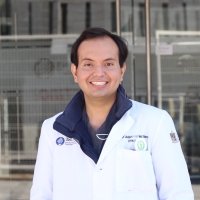Luis Rodríguez’s Clinical Research Journey Continues at Harvard Medical School

“Before doing Foundations of Clinical Research, I didn’t know how to use statistical programs at all. I gained many valuable foundational skills in Stata that I was able to build upon in Global Clinical Scholars Research Training when we started coding.”
After completing foundational clinical research training at Harvard Medical School, Luis Rodríguez, MD, felt inspired to deepen his expertise in ophthalmology research. Following a fellowship at the Bascom Palmer Eye Institute in Miami, Florida, he returned to his home country of Venezuela to accept a faculty position in the ophthalmology department of Hospital Domingo Luciani in Caracas, focusing on the cornea and ocular surface.
Rodríguez found tremendous value in the skills he gained through the Foundations of Clinical Research program, especially in his ability to interpret the research methodology and statistical analyses presented in scientific articles relevant to his clinical ophthalmology work.
“After completing the program, I developed a much deeper understanding of the scientific literature I was reading,” he shares. “Although I had previously collaborated on research publications, I wanted to build a stronger foundation and fully understand the key steps involved in developing a project that ultimately gets published.”
Applying to Harvard Medical School’s more advanced Global Clinical Scholars Research Training program felt like the natural next step—and one for which the foundational program had thoroughly prepared him.
Gaining Confidence and Expertise in Statistical Analysis
A key component of conducting impactful clinical research is the ability to use statistical analysis tools, such as Stata, to accurately interpret data, identify meaningful patterns, and draw evidence-based conclusions that inform clinical decision-making and advance patient care. Rodríguez credits the introductory training in statistical methods during Foundations of Clinical Research as essential groundwork for the more advanced analysis covered in Global Clinical Scholars Research Training.
“Before doing Foundations of Clinical Research, I didn’t know how to use statistical programs at all,” he says. “I gained many valuable foundational skills in Stata that I was able to build upon in Global Clinical Scholars Research Training when we started coding.”
Advancing Ocular Trauma Treatment Through Clinical Research
One of the pivotal components of the Foundations of Clinical Research program is the development of a research abstract and an ePoster, supported by faculty and peer feedback. In the Global Clinical Scholars Research Training program, this experience is elevated through a capstone project where participants design a research proposal with the goal of securing funding. Rodríguez notes that the feedback he received during the foundational program directly informed and strengthened his capstone work.
At Hospital Domingo Luciani in Caracas, where Rodríguez serves as a faculty member and clinical researcher, the ophthalmology team sees a high volume of patients with chemical burns to the eye. In today’s evolving medical landscape, regenerative therapies like autologous serum eye drops—derived from a patient’s own blood—and insulin eye drops offer promising options to help restore the corneal epithelium.
For his capstone project in the Global Clinical Scholars Research Training program, Rodríguez is investigating which of these two treatments more effectively and rapidly restores the integrity of the ocular surface. His proposed randomized clinical trial would assign patients to one of the therapies and evaluate outcomes in the hospital’s ophthalmology trauma division.
“One of the best things about the program is that it teaches you how to secure funding for your research. Ultimately, that’s the goal of your capstone project,” Rodríguez explains. As part of the Global Clinical Scholars Research Training program, participants learn how to write compelling grant proposals and complete an elevator pitch assignment, building on the scientific communication skills introduced in the Foundations of Clinical Research program.
With guidance from experienced faculty, students learn how to clearly convey the significance of their research, its impact on patients, and why it is worthy of funding. “The elevator pitch presentation skills have been a very valuable part of the program for me,” Rodríguez adds, “especially as I think ahead to research conferences where I’ll need to communicate the value of my work to important funders in situations where I may not have 10 minutes to do so.”
Evolving from Learner to Mentor to Teacher
Since beginning the Foundations of Clinical Research program and continuing through his current experience in the Global Clinical Scholars Research Training program, Rodríguez’s vision for his career has grown from individual skill-building to fostering a broader research culture.
“At first, I was focused on developing research skills for myself,” he shares. “But Global Clinical Scholars Research Training emphasized the importance of mentorship and building research teams to make projects happen.” That shift in mindset has helped him recognize the essential role that ophthalmology residents could play in research efforts. “Residents are a fundamental part of the team. They can help capture patient data and follow their progression,” he explains.
One assignment in the program, a simulated journal club, gave him a practical model for engaging his residents. Inspired by the experience, Rodríguez launched a formal journal club at his hospital. “We meet regularly to review high-quality research from around the world,” he says. “It helps us understand how leading teams structure their studies and sparks ideas for projects we can pursue at our own hospital.”
In addition to mentoring residents, Rodríguez now teaches them research methodology and statistics, helping build a foundation for collaborative research in his department.
Written by: Meredith Faxon Murray
